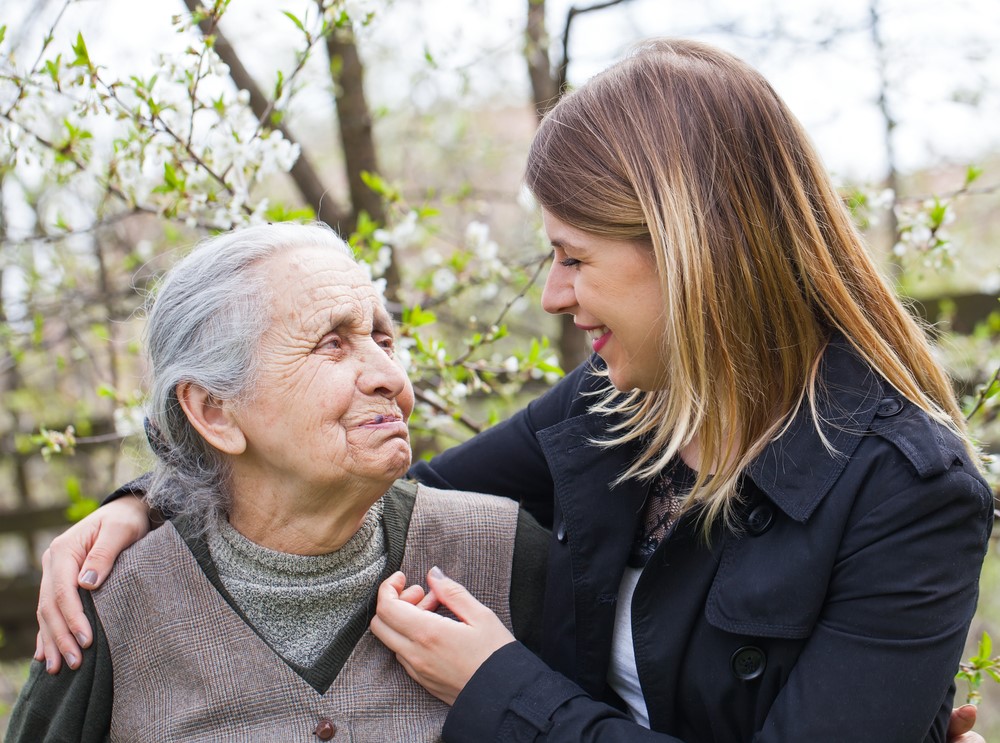
Most discussions on family caregiving talk about adult children supporting aging parents or one spouse supporting the other. Yet, these aren’t the only patterns. Sometimes grandchildren are caring for elderly grandparents instead.
This may happen because there’s a considerable rift between the senior and their adult child. Other times, the grandchild may live nearer or could be the most willing to take on the role.
There are certainly benefits, as caregiving offers the chance to give back and to support a loved one. Plus, grandchildren are often relatively young caregivers, perhaps in their 30s or 40s. Being younger reduces the risk of the caregiver burning out. It also means the caregiver is less likely to have health problems of their own.
But, caring for elderly grandparents isn’t necessarily easy.
Caregivers always face some challenges, including a lack of time, the risk of being overwhelmed, and simply not knowing what to do. Being young can add a few new difficulties to the mix.
Challenges in Caring for Elderly Grandparents
Less Chance to Prepare for the Future
Caregiving takes considerable time and energy, leaving you less chance to plan for your own future. This may not be a huge problem if you’re only providing care for a year or two.
But… many grandchildren are caregivers for much longer than that.
After all, modern medicine is astonishing, helping people to live longer and healthier lives than ever before. Sometimes a senior will live for years or even decades after they were expected to – and need care throughout that time.
Some grandchildren end up bouncing from one caregiving role to the next. For example, a granddaughter might support first her grandfather, then her grandmother, then perhaps her own mother or mother-in-law.
The time spent caregiving effects the grandchild’s future in multiple ways, including the following:
- They simply don’t have the time to sit down and make plans.
- Caregiving can be expensive, even when the senior has some money of their own. Even a small financial drain could cut into the grandchild’s ability to save for their own retirement, for a house, or for other important things.
- It’s incredibly difficult to hold down a career while caregiving.
- Even if a caregiver manages to keep their job, their performance may suffer or they may not be able to pursue promotions. That can lead to less income over time and stunted career advancement.
- Also, there are simply fewer opportunities when you need to spend a long time supporting loved ones.
There’s An Emotional Toll
Caring for elderly grandparents, or for anyone, comes with an emotional toll.
Simply put, it’s hard to watch someone’s health deteriorate over time. You may be able to make their experience easier, but you can’t completely protect them from health crises or accidents.
We’re also talking about a family member, someone who may mean a lot to you. This can make things even more challenging emotionally.
The repetitive nature of caregiving can be draining as well. This is often subtle, so you mightn’t notice it at first. But, the tiny little difficult things add up, especially if you’re also not able to get out often and have a minimal social life (which often happens).
Caregiving Can Be Physically Challenging Too
We can’t forget about the physical side of things. Caring for elderly grandparents will often involve some physical tasks, like helping around the house or even lifting and helping to transfer them.
Even light physical tasks can add up, leaving caregivers exhausted.
Caregivers also have their own tasks to take care of, like housework, their job, and perhaps raising their own children. It’s not surprising that things can quickly get overwhelming.
Younger Caregivers May Be Poorly Equipped

Caregivers tend to get thrown in the deep end. They’re often faced with challenging situations, where there are no easy answers and little support.
Dealing with incontinence is one of many examples. Caregivers often struggle to find the right products and ways to provide support. The situation can get even more challenging with dementia patients, who are sometimes stubborn or even aggressive with their caregivers.
These challenges apply to young and older caregivers alike.
However, younger caregivers have less life experience and may find such difficulties much more overwhelming.
There’s Less Time For Other Things
Life is full of opportunity costs. Doing one thing means less time to do something else.
Because caregiving can take up so much time, the amount of potential loss is considerable. Some caregivers find that they exercise less, see friends less often, and don’t do as many things for themselves.
You may even find that you start pushing off doctor’s appointments because you’re short on time or money. Such patterns can easily compromise your health.
Relationships can be damaged too – to the extent that sometimes caregiving ruins marriages.
Things You Can Do
There’ a lot of caregiving advice out there already.
Much of it starts with the idea of self care. To which most caregivers will let out a groan.
I found this as a young caregiver myself. There was no end to the posts saying that I should care for myself and focus my own needs, while doing so in practice felt literally impossible.
Like, how do you get 8 full hours of sleep when your partner wakes up and needs assistance multiple times per night?
I’ve had a lot of time to read and think since those days – and have found some approaches that may help. They don’t solve any of these challenges overnight, but they can make things a little easier.
Think Carefully About What’s Needed
Many caregiving challenges stem from the amount of time and energy you’re spending.
Most of the time, though, it’s possible to significantly cut your workload down.
A good starting point is to look closely at what your grandparent truly needs to be safe and healthy.
The word need is important here. Some seniors are quite demanding and may expect much more than is realistic.
For example, your grandparent may want you to mow his lawn each week because he can’t and doesn’t want to hire someone. Or, perhaps he wants you to visit daily and demands a lot of attention, as he doesn’t like being on his own.
It’s easy to give in to such requests and to feel guilty for refusing.
But, trying to meet such requests regularly quickly leads to burnout – giving you less energy for what your grandparents do need.
Start To Draw Boundaries
The next part is the hard one – boundaries.
Boundaries are important in any relationship, helping people to retain individuality and to meet their own needs. The significance of boundaries is even higher with caregiving, as you have such demands on you.
Don’t worry though.
While boundaries can feel overwhelming, they’re certainly not impossible. They also tend to improve relationships in the long run, dramatically reducing the risk of resentment and drama.
Be Kind To Yourself
Caregivers often feel guilty.
There’s this sense that you’re not doing enough. That you’re failing. That you’re making the wrong decisions. You might even think you’re being selfish, particularly if you sometimes feel resentful of your grandparent.
But, honestly, you’re not doing anything wrong.
It doesn’t matter whether you’re caring for elderly grandparents, for a spouse, for an aging parent, or for someone else, you won’t get things perfect all the time.
You’re human.
You have limited capacity. You can’t do everything. And… sometimes you might not think straight, might get angry, might make a bad decision. That happens to us all.
Kristen Neff’s book on self-compassion is a great tool for getting a handle on some of these ideas. Self-compassion is also useful as a way of supporting yourself when you’re overwhelmed but can’t leave the situation at hand.
Pay Attention To Your Capacity

This final approach does relate to self-care, but we’re taking a different angle than normal.
There are two important areas to consider with self-care – what and when.
What relates to what you actually need.
- Do you need variety or stability?
- Do you need to rest and calm down, or do you need something fun and energizing instead?
- Do you need social connection?
- Sleep? Time out?
- What about some type of treat, something that makes you feel good?
Matching your self-care techniques with your needs is much more powerful than picking random self-care ideas from a list.
When is all about timing.
Specifically, you need to take care of yourself before you hit a crisis point – otherwise everything will quickly get awful.
I discussed a capacity model in another post that can help you to find the right timing.
Doing so can be hard at first. It might feel odd to prioritize yourself when it doesn’t feel like you need to. But, taking care of yourself early like this reduces the risk that you’ll burnout.
It also means that if there is a serious crisis, you’ll have all the resources that you need to cope well.
Feeling Overwhelmed?
Check out our Caregiving Consulting service for personalized support and guidance.


Leave a Reply